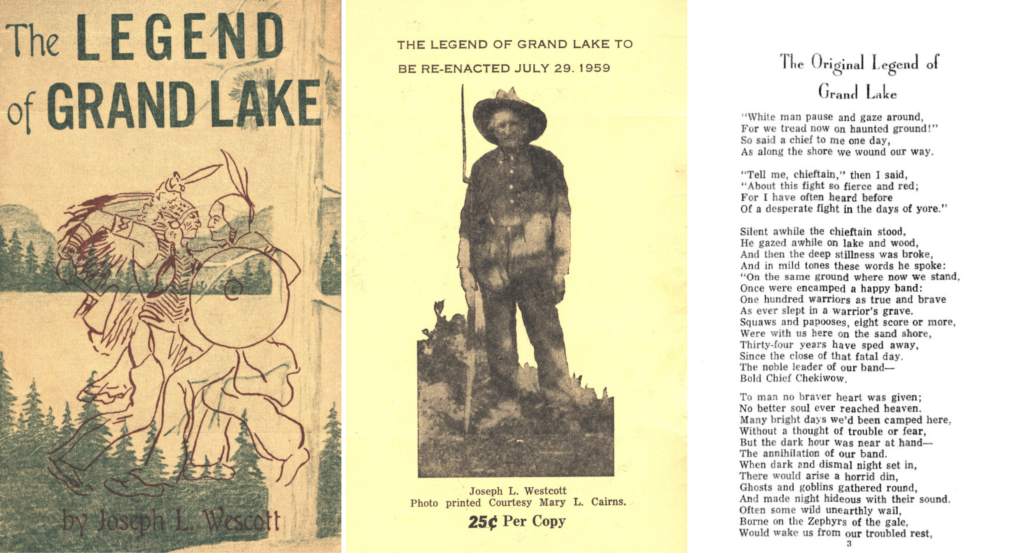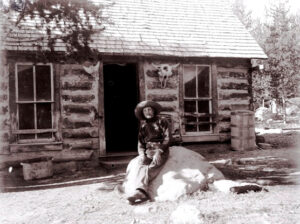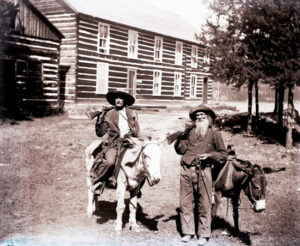Meet Joseph Leander Wescott (1835-1912 or maybe -1914), mountain man, Civil War veteran, miner, hunter, twice victim of fraud, survivor, surveyor, postmaster and author of the epic poem The Legend of Grand Lake.
Wescott was one of the first white settlers in Hot Sulphur Springs, Colorado, and later in Grand Lake, which is located to the west of Rocky Mountain National Park.
|
|
One day Wescott came upon a solitary figure, an old Ute chief, on the lake shore who shared the story of a dramatic three-day battle between the local Ute tribe and an Arapaho raiding party. With the aid of prospector John Barbbee, Wescott retold this saga of slaughter, vengeance, honor, pathos, ghosts, sudden storms and Black Bear facing Black Eagle mano a mano in 622 lines of rhymed couplets with a healthy dose of analogies to the predatory techniques of wolves and eagles. The poem was published in the first number of the Grand Lake Prospector on July 29, 1882, and then published in a booklet form by Fred H. Quincy in 1926. The version linked below is from a reprint of the booklet by Sky-High News of Granby, Colorado in 1958.

Cover, title page, opening lines in a 1958 reprint of Wescott’s The Legend of Grand Lake, which tells of an epic battle between local Utes and an Arapaho raiding party along the shores of Grand Lake, Colorado’s largest and deepest natural lake. Click the picture to view and download the 20-page booklet.
A confirmed bachelor, Wescott does not have progeny to tell his story, but the “Judge,” as he was known, led a colorful enough life to get this notice from the Grand Lake Area Historical Society:
In the late 1850s they came, young and old, bitten by the bug of Pikes Peak fever, yearning to find their fortune in the mineral rich hills of this Kansas Territory called Colorado. Some succeeded, others saw the Elephant and headed home, but many remained to follow the callings whispered to them by this isolated and pristine wilderness. One of these adventurers was Joseph Lean[der] Wescott.
After surviving his bout of Colorado gold fever Wescott enlisted with Company G of the 1st Colorado Volunteers. This little company of men would clash head on with the Confederate Army at Glorieta Pass, stopping the Confederate incursion into New Mexico and thus turning the tide of the war in the far west. It was during the New Mexico campaign that our J.L. Wescott would contract a dismal case of rheumatism.
In 1865, after the War was over, many soldiers headed west by foot and on horseback. Wescott returned over Caribou Pass swinging and slipping, riding in a hammock between two mules, searching for a cure to his agonizing rheumatism. His pain led him on a five day trip to Hot Sulphur Springs and the healing waters of the mineral springs. Here he would stay and eventually stake a claim for the 160 acres surrounding the springs. Misfortune would rear its ugly head in the name of one Susan Boshman. She, aided by others, would swindle Wescott out of his beloved Hot Sulphur property. With that, he headed to Grand Lake where he would become the area’s first serious white settler. The year was 1867, and Wescott would meet a lone Indian camped on the shore of Grand Lake. This brave would convey a tale and Wescott, using his flair for creative writing, would turn this legend into his famous poem “The Legend of Grand Lake”. His misfortune was not over. Wescott was betrayed once again by a young fellow who spent the summer with him. At the end of the season the visitor took a large catch of trout and Wescott’s burros to Georgetown, promising to sell the fish and return with supplies for the winter. Houseguest and burros were never seen again, and the snows set in. Judge Wescott survived the winter by roasting a buffalo robe and making a stew from his moccasins and a leather chair seat.
Like many a veteran of that era Wescott would settle into these mountains where he hunted and fished, drank too much, befriended the natives and shot a few, never speaking of his past or his age and never taking a wife. But unlike many an early settler to this region, Wescott stayed, built a few cabins, became friends with the Proctor family, watched in 1876 as Colorado shed its Territorial cloak to become a state, became Grand Lake’s first postmaster in 1877 [he was actually the second postmaster] and platted Grand Lake City in 1888.
The old Judge died in 1914 leaving Grand Lake history with one of its most colorful characters and a written legacy in The Legend of Grand Lake. As for the “Judge” part, there is no evidence he was anything but self-appointed.
Despite some conflicting evidence in the record (such as his death in two different places two years apart), we can with some certainty trace Joseph Wescott’s descent from Stukely and Juliana Westcott: Joseph Leander8 Wescott, John7, Robert6, Robert5, Robert4, Zorobabel3 Westcott, Robert2, Stukely1.
The following sources round out (and in some cases, correct) the story of Joseph Westcott told by the Grand Lake Area Historical Society and the publisher’s introduction to The Legend of Grand Lake:
- A FamilySearch.com family tree shows the line of descent ending with the bachelor poet Joseph L. Wescott
- Edna Lewis’ The Westcott Family Tree (1999) traces the descent to the sixth generation
- The 1850 and 1860 Federal census for Grand Rapids, Michigan and Marshall (later called Marshalltown), Iowa respectively.
- Joseph’s Civil War pension records
- Obituary of Joseph’s sister Sophia Westcott in the March 9, 1912 Times Republican (Marshalltown, Iowa).
Joseph Leander Wescott was born in 1835 in Kings County, Nova Scotia, the son of John and Hannah (Williams) Wescott. His great great grandfather Robert migrated from North Kingstown, R.I. in 1765 to Canada to take possession of lands in the “Newport Grant.” After expelling French citizens from the province beginning in 1755 and continuing through 1765, the Crown offered grants of land to loyal British citizens in New England who were willing to occupy and develop the land vacated by the Acadians. Four generations of Wescotts remained (and prospered) in Nova Scotia until John Wescott (1801-1865) and family moved to Grand Rapids, Michigan some time before 1850. The family would later move to Marshall, Iowa. The 1860 Federal census lists John and Hannah Wescott and Joseph’s younger brother “C.A.” (for Charles Arthur) among the citizens of Marshall, but Joseph has moved on, seeking his fortune in the Colorado Territory.
And now the conflicting records of Joseph Wescott’s death and burial. According to a memorial on FindAGrave.com Joseph died on September 27, 1912 in Marshalltown (the new name for Marshall), Iowa, and was buried in the Riverside Cemetery in that city. The memorial includes a portion of his obituary:
Joseph L. Wescott, aged 80, a brother of the late Alvin (should be ‘Alfred’, not Alvin) Wescott, of this city, died at 8 o’clock this morning at the home of his niece, Mrs. W. H. Waltz, 403 South Fifth street, of uremic poisoning following locomotor ataxia. Mr. Wescott was a native of Kings county, Nova Scotia. He never married, and for many years, or since the civil war, in which he served, he has lived as a mountaineer near Middle Park, Colorado. Last spring, owing to failing health, he came to this city to make his home with his niece.
But according to the Grand Lake Area Historical Society profile and a second FindAGrave memorial, Joseph died two years later was was buried in Grand Lake, Colorado. Neither memorial includes a picture of a grave marker. Perhaps his body was moved to Colorado, or maybe just a marker was placed in the Grand Lake Cemetery to honor one of its famous citizen.
by David Wescott Smith, SSWDA Historian, October 31, 2021. Updates and corrections appreciated.


